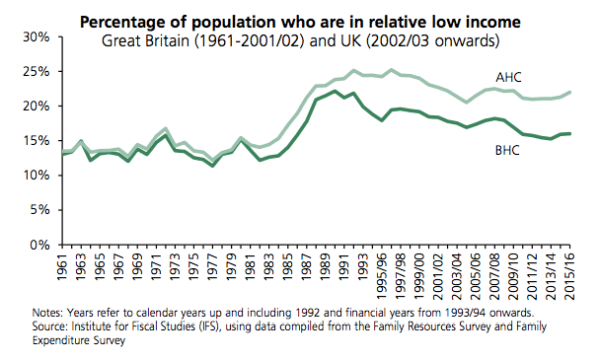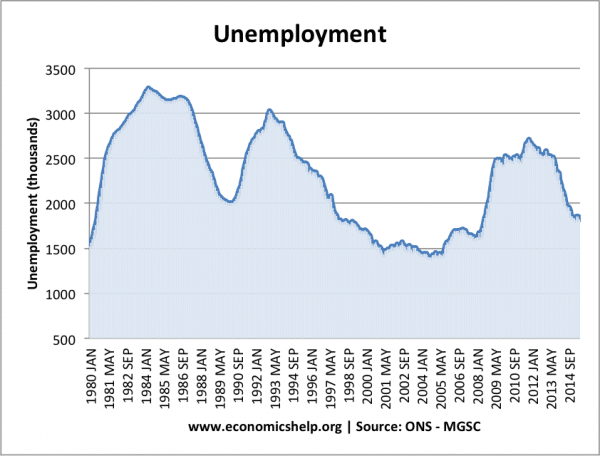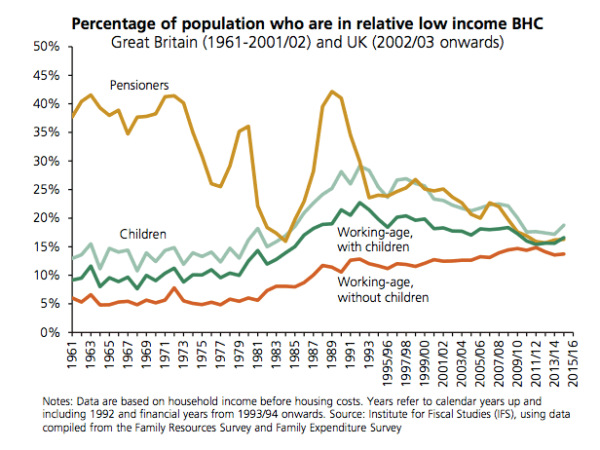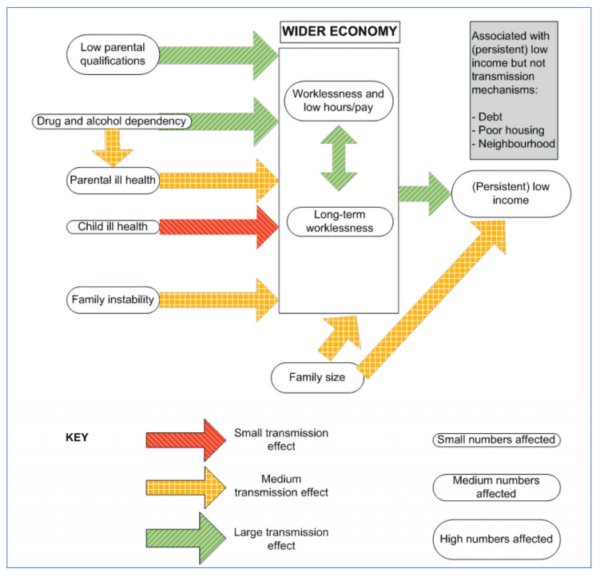There are two main classifications of poverty:
- Absolute poverty – income below certain income necessary for basic living standards
- Relative poverty – household income 60% below median wages.
- See: Measuring poverty
Absolute poverty was much more of an issue before the introduction of the Welfare State in 1945. Since 1945, rising living standards and a universal benefit system have to a large extent reduced this absolute level of poverty, but relative poverty and inequality is still an issue. Also, many people living below the poverty threshold struggle to meet basic necessities – such as rent, food and loan repayments.
Also, when measuring poverty it is most useful to measure disposable income – after housing costs.
The main causes of relative poverty in the UK are
- Inequality in wages – low skilled workers stuck in low paid jobs
- Unemployment and long-term economic inactivity – no wage income, reliant on benefits
- HIgh renting costs
- Debt and debt repayments
Relative poverty in the UK
This is a measure of relative poverty in the UK. It measures those who live below 60% of median incomes – so it is a changing absolute level of income.
Causes of poverty in more detail
1. Wage inequality. Approx one in nine workers receives the national minimum wage – which is statutory legal minimum. Many workers on this wage rate will receive less than 60% of median earnings. In recent years, there has been a growth in low-paid work – especially for low-skilled workers.
2. Job insecurity and part-time work. Increased labour market flexibility has led to a rise in zero hour contracts and part-time work. This can adversely affect workers income because they have no guarantee of wages. A short number of hours can lead to individuals falling behind with debt repayments and rent, which compounds their situation
3. Unemployment. Unemployment is the biggest cause of poverty in the UK because people rely only on benefits
- 65% of the poor are not in work
- Levels of unemployment can cause short-term fluctuations in poverty levels. For example, the 1980s, was generally a period of high unemployment, leading to a rise in inequality we saw in that decade.
4. Economic inactivity Related to unemployment is economic inactivity. People may be not classed as unemployed (not actively seeking work) but at the same time, they are not in employment. This could be due to long-term sickness, disability, discouragement from the labour market, forced to take early retirement or single parents caring for their children. Inactivity means a large source of income is government benefits. In recent years, benefits for working-age people have been index-linked – this means benefits have generally risen faster than average incomes.
5. Old age People over 65 have traditionally been more at risk of relative poverty, as pension incomes are significantly less than average incomes. However, in recent years, pension poverty has seen the sharpest fall due to a rise in the real value of the state pension. After housing costs also tend to reduce inequality for pensioners as they are more likely to own a house than the younger generation.
This shows reduction in number of pensioners who are relatively low income (before housing costs)
6. Regressive Taxes. Tax changes in the 1980s and 1990s have put a higher burden of tax on the poor. There has been a shift in taxes from progressive income tax to regressive, indirect taxes, therefore causing an increase in inequality. For example, the top marginal rate of income tax has fallen from 83% in 1979 to 40% in 1989. The basic rate has come down from 33% to 22%. However, the overall tax burden has remained unchanged because the govt has increased VAT and indirect taxes on alcohol and petrol and extending VAT to domestic fuel. These taxes take a higher % from those on low incomes
7. Inheritance This allows wealth inequality to be passed on and magnified from generation to generation.
Influences over future poverty
According to a study by HM Govt (Jan 2014) into the influences over child poverty, influences over poverty include a wide range of factors
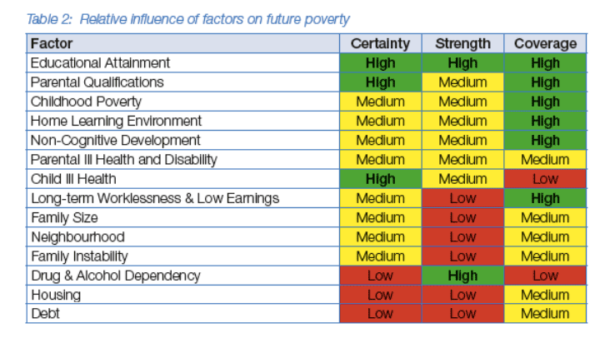
- Educational attainment – this is significant influence on the risk of unemployment and also kind of job that someone will receive. Those who leave school without recognised qualifications at much greater risk of unemployment and low-paid work.
- Parental qualifications. This has an influence on children’s expectations and own educational attainment.
- Childhood poverty
- Home learning environment – is child encouraged to study and go to university
- Child-ill health – can affect confidence and education
- Neighbourhood – poverty is concentrated in certain regions and even specific locations of city
- Drug and alcohol dependency – have strong influence over work prospects
- Debt – financial fluency can affect how people manage money and their future prospects
Source: HM Government – Child Poverty Evidence Review (2014)
Worklessness is a major cause of serious poverty. Factors which contribute to worklessness behind child poverty.
Related

